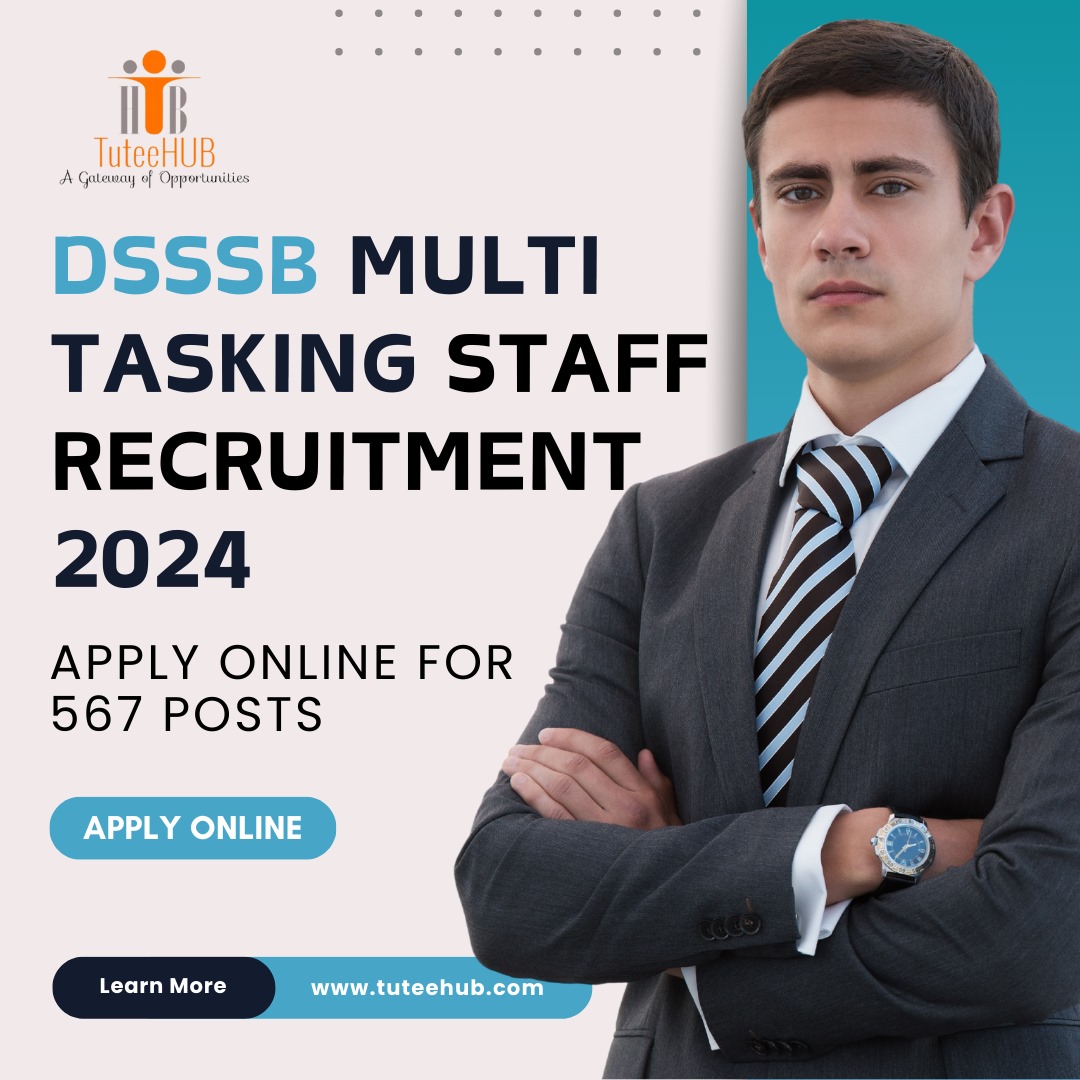DSSSB Multi Tasking Staff Recruitment Tutorial

Overview
The Delhi Subordinate Services Selection Board (DSSSB) is a recruitment body established by the Government of Delhi to fill vacancies in various subordinate services and posts under the Delhi Government. DSSSB conducts competitive examinations to select eligible candidates for these positions.
2. Different Exams Conducted by DSSSB
DSSSB conducts a wide range of exams to fill vacancies in different categories of posts, including:
- Category A: Posts requiring a graduate degree, such as Assistant Engineer, Junior Engineer, Statistical Assistant, and Accounts Assistant.
- Category B (Non-Technical): Posts requiring a graduation or higher qualification, such as Primary Teacher, Librarian, Assistant, and Computer Assistant.
- Category B (Technical): Posts requiring a diploma in engineering or technology, such as Junior Engineer (Civil/Electrical/Mechanical), Pharmacist, and Surveyor.
- Category C: Posts requiring a higher secondary certificate (Class 12th) or equivalent, such as Clerk, Stenographer, and Data Entry Operator.
- Category D: Posts requiring a minimum qualification of Class 8th pass, such as Peon, Chowkidar, and Sweeper.
3. Exam Pattern for Various Categories
The exam pattern varies depending on the category of post being applied for. Here is a general overview of the exam patterns for different categories:
Category A:
- Written Exam: Objective-type questions covering General Awareness, Reasoning, Mathematics, English, and Technical Knowledge specific to the post.
- Skill Test/Interview: For certain technical posts, a skill test or interview may be conducted in addition to the written exam.
Category B (Non-Technical):
- Written Exam: Objective-type questions covering General Awareness, Reasoning, Mathematics, English, and Knowledge of the relevant subject area.
- Skill Test/Interview: For some posts, a skill test or interview may be conducted to assess the candidate's proficiency in specific skills.
Category B (Technical):
- Written Exam: Objective-type questions covering General Awareness, Reasoning, Mathematics, English, and Technical Knowledge specific to the post.
- Skill Test/Interview: A skill test or interview is mandatory for all Category B (Technical) posts to evaluate the candidate's practical skills and knowledge.
Category C:
- Written Exam: Objective-type questions covering General Awareness, Reasoning, Mathematics, English, and Basic Knowledge of Computers.
- Skill Test/Interview: For certain posts, such as Stenographer, a skill test or interview may be conducted to assess the candidate's speed and accuracy in dictation and typing.
Category D:
- Written Exam: Objective-type questions covering General Awareness, Reasoning, and Basic Mathematics.
- Physical Test: For physically demanding posts, such as Peon and Chowkidar, a physical test may be conducted to assess the candidate's fitness and stamina.
4. Eligibility Criteria for Applying to DSSSB Exams
The eligibility criteria for applying to DSSSB exams vary depending on the category and post being applied for. Generally, candidates must meet the following requirements:
- Be a citizen of India.
- Possess the minimum educational qualification and work experience specified for the post.
- Meet the age limit prescribed for the category and post.
- Not be barred from employment under the Government of India or any state government.
FAQs
-
What is DSSSB? DSSSB is the Delhi Subordinate Services Selection Board, responsible for recruiting candidates for various government positions in Delhi.
-
What types of exams does DSSSB conduct? DSSSB conducts exams for various categories, including Category A (graduate degree), Category B (non-technical and technical), Category C (higher secondary), and Category D (Class 8th pass).
-
How does the exam pattern vary for different categories? Categories A, B, and C typically have written exams, while Category D has a physical test. Skill tests or interviews may be conducted for certain posts.
-
What are the eligibility criteria for DSSSB exams? Eligibility varies depending on the post but generally includes Indian citizenship, minimum educational qualifications, and the prescribed age limit.
-
How can I apply for DSSSB exams? Applications are usually made online through the official DSSSB website.
-
What is the selection process for DSSSB exams? The selection process typically involves a written exam, skill tests/interviews (for certain posts), and document verification.
-
How can I prepare for DSSSB exams? Study the exam pattern, syllabus, and previous year's papers. Join coaching classes or use online study materials for preparation.
-
What are the career benefits of clearing DSSSB exams? Clearing DSSSB exams provides job opportunities in various subordinate services and posts under the Delhi Government.
-
Is there any reservation policy for DSSSB exams? Yes, there is a reservation policy for certain categories, including SC, ST, OBC, Ex-Servicemen, and Physically Disabled candidates.
-
How can I get more information about DSSSB exams? Visit the official DSSSB website or contact the relevant examination authorities for detailed information.
Tutorials are for educational purposes only, with no guarantees of comprehensiveness or error-free content; TuteeHUB disclaims liability for outcomes from reliance on the materials, recommending verification with official sources for critical applications.
Similar Tutorials

Advanced Excel Charts Tutorial: How to Create Prof...
Learn how to create professional charts in Excel with our advanced Excel charts tutorial. We'll show...

Advanced Excel Functions: Tips and Tricks for Boos...
Are you tired of spending hours working on Excel spreadsheets, only to find yourself stuck on a prob...

Apache Flume Tutorial: An Introduction to Log Coll...
Apache Flume is a powerful tool for collecting, aggregating, and moving large amounts of log data fr...
Explore Other Libraries
Related Searches
Please allow ads on our site
Kindly log in to use this feature. We’ll take you to the login page automatically.
Login
Join Our Community Today
Ready to take your education and career to the next level? Register today and join our growing community of learners and professionals.

Your experience on this site will be improved by allowing cookies. Read Cookie Policy
Your experience on this site will be improved by allowing cookies. Read Cookie Policy


Comments(1)